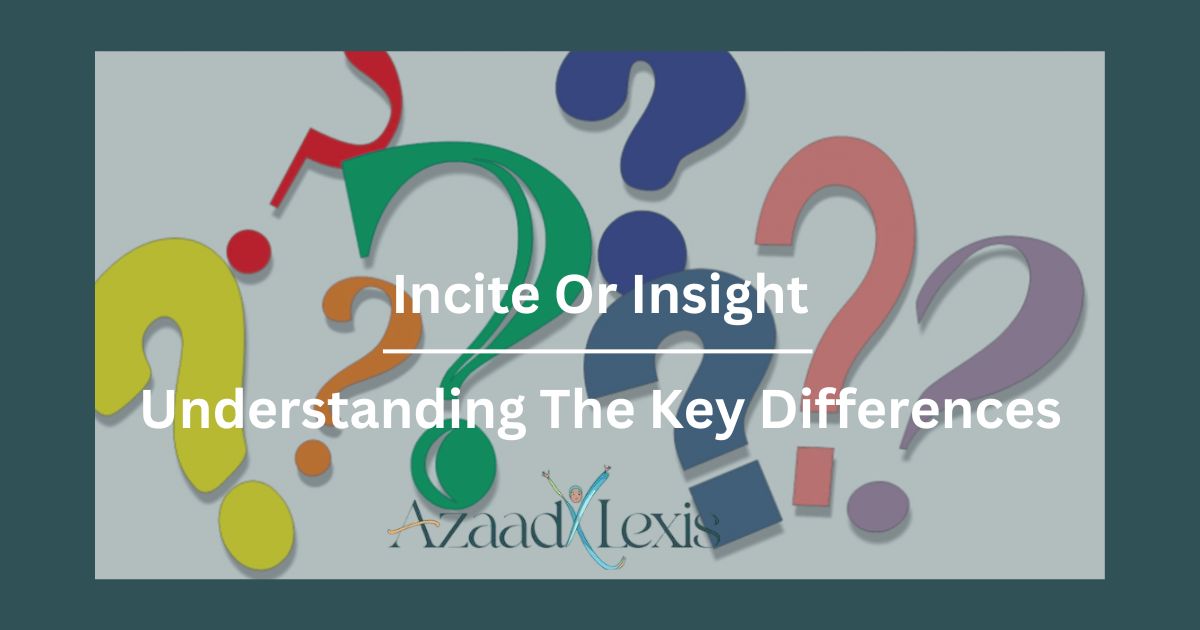Language can be tricky, especially when words sound similar but have vastly different meanings. This is the case with “incite” and “insight” two words that often trip people up due to their phonetic similarity.
Understanding these words is crucial for clear communication, whether you are writing, speaking, or interpreting others’ words. Let’s dive deep into the differences between “incite” and “insight”, and explore their usage through various scenarios.
Understanding Incite And Insight
Before we explore these terms in detail, it’s important to grasp the fundamental differences. “Incite” and “insight” may sound alike, but their meanings and implications are far from interchangeable.
Incite: Definition and Usage
The word “incite” is a verb that means to provoke or stir up, often in a negative context. It is used when someone is encouraging or spurring on actions, typically related to strong emotions or behavior. The term frequently carries a connotation of urging on actions that might lead to chaos or trouble.
Examples
- A politician might incite a crowd to protest against a controversial policy.
- A social media post could incite anger among users by spreading false or inflammatory information.
In these cases, “incite” is associated with triggering strong, often negative reactions.
Insight: Definition and Usage
On the other hand, “insight” is a noun that refers to a deep understanding or the ability to see the inner nature of things. It denotes a clear, often sudden realization or comprehension about a complex subject or situation.
Examples
- A seasoned teacher might have insight into the learning difficulties of a student and offer personalized guidance.
- Reading a profound book can give someone valuable insight into human nature or societal structures.
Here, “insight” is associated with clarity, wisdom, and understanding.
Side-by-Side Comparison
Let’s compare these terms directly to solidify our understanding:
| Feature | Incite | Insight |
| Part of Speech | Verb | Noun |
| Meaning | To provoke or stir up (usually negative) | Deep understanding or realization |
| Connotation | Often negative, suggesting provocation | Positive, suggesting clarity or wisdom |
| Usage Example | Incite a riot | Gain insight into a problem |
Everyday Usage Examples
To help distinguish these terms in real-world contexts, consider the following scenarios:
Scenario 1: A Political Rally
At a political rally, a leader’s fiery speech could incite supporters to demand immediate change. The passion and energy stirred up in the crowd might lead to demonstrations or protests. Here, the leader’s words catalyze action, exemplifying the use of “incite.”
Conversely, if a political analyst provides insight into the underlying causes of public dissatisfaction, they offer a deeper understanding that can help inform future policies. This insight aids in clarifying the reasons behind people’s emotions and actions.
Read this Blog: Inflammable Or Flammable: Which One Should You Use?
Scenario 2: A Business Meeting
During a tense business meeting, an executive’s harsh comments might incite frustration among employees, leading to a heated argument. This negative reaction is directly provoked by the executive’s words, illustrating “incite.”
Meanwhile, a thoughtful suggestion from a colleague could offer insight into improving workflow efficiency. This insight helps the team understand the problem better and come up with effective solutions.
Scenario 3: Online Discussions
An inflammatory article might incite a flurry of angry responses in an online forum, with users arguing passionately. The article acts as a trigger for emotional reactions, demonstrating “incite.”
In contrast, a well-researched blog post could provide readers with valuable insight into a complex topic like climate change, enabling them to grasp the nuances and make informed decisions.
Conclusion
The distinction between “incite” and “insight” is significant, despite their similar sounds. “Incite” is about provoking action or emotion, often negative, while “insight” pertains to gaining deep understanding or clarity. By carefully considering the context in which these words are used, one can communicate more effectively and avoid common misunderstandings.
Whether you’re writing an essay, giving a speech, or simply engaging in conversation, recognizing the difference between inciting action and offering insight can greatly enhance your language skills. Keep this guide in mind, and you’ll navigate these tricky terms with ease, ensuring your words convey the intended meaning every time.

